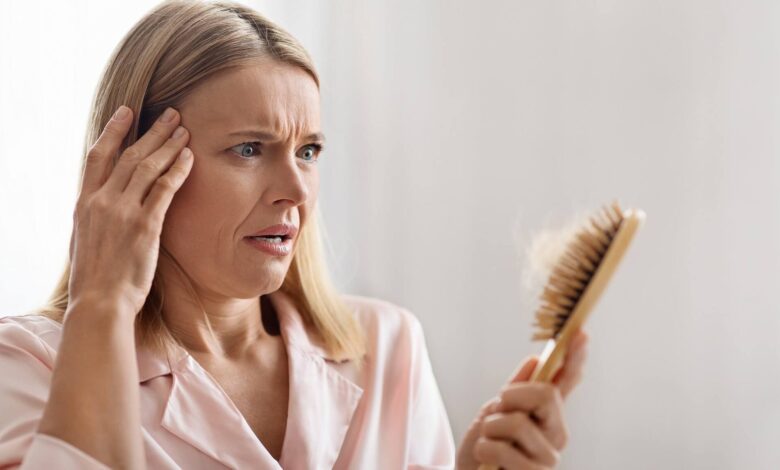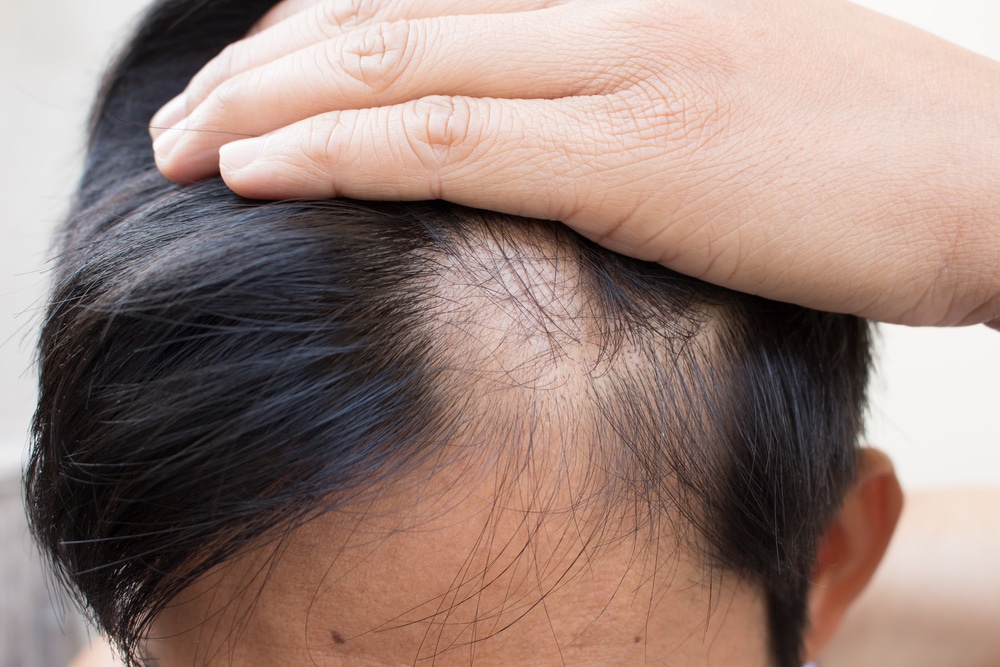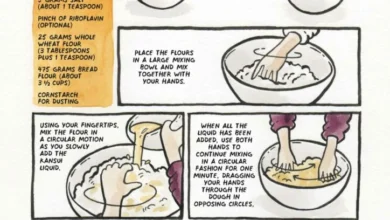Does Menopause Trigger Hair Loss: Hormonal Modifications 101

When you’ve observed your hair turning thinner or much less voluminous as you method or go through menopause, you’re not alone. Many ladies experience modifications in hair texture and density throughout this time, usually resulting in frustration and confusion. However, what’s actually behind this transformation? By unpacking the hormonal modifications that outline menopause, we will make clear why hair loss occurs and how one can tackle it with information and confidence.
What Is Menopause?
Menopause is a pure organic course of that marks the end of a woman’s reproductive years, usually occurring between the ages of 45 and 55. It’s formally identified after 12 consecutive months without a menstrual interval and is pushed by a gradual decline in the production of estrogen and progesterone by the ovaries. This hormonal shift brings a few vary of bodily and emotional modifications, together with hot flashes, nighttime sweats, temper fluctuations, and, for a lot of ladies, noticeable modifications in hair and pores and skin. Whereas menopause is a standard part of ageing, its signs and timing can vary extensively from individual to individual.

Why Does Menopause Occur?
- Pure Growing old Course of: As ladies age, the ovaries steadily lose their capability to supply eggs, resulting in a decline in reproductive hormones.
- Hormonal Modifications: Ranges of estrogen and progesterone are considerably lower, disrupting the menstrual cycle and ultimately causing it to cease.
- Genetic Components: The timing of menopause is commonly influenced by genetics, with many women experiencing menopause at a similar age as their mothers or sisters.
- Ovarian Operate Decline: Over time, the follicles within the ovaries turn into much less sensitive to hormonal indicators, decreasing fertility and ultimately ending menstruation.
- Well-being and Way of life Influences: Sure medical therapies, surgical procedures (like the removal of the ovaries), or well-being situations can set off early menopause or have an effect on its development.
Does Menopause Trigger Hair Loss?
Sure, menopause could cause hair loss as a result of vital hormonal modifications that happen throughout this stage of life. As estrogen and progesterone ranges decline, their protective effects on hair development diminish, resulting in elevated hair shedding and thinning. At the same time, the relative improvement in androgens (male hormones) could cause hair follicles to shrink, leading to finer, weaker hair and generally even patchy hair loss. Whereas not every girl will expertise noticeable hair loss during menopause, it’s a frequent concern, and understanding the hormonal connection is vital to discovering efficient options and sustaining hair well-being.
Hormonal Modifications 101
The Position of Estrogen and Progesterone
Estrogen and progesterone are the first feminine hormones responsible for regulating the menstrual cycle and supporting hair development. In the course of the reproductive years, these hormones assist in maintaining hair in its growth phase longer, leading to fuller, healthier hair. As menopause approaches, the ovaries produce much less estrogen and progesterone, which disrupts the hair development cycle and might result in elevated shedding and thinning.
The Rise of Androgens
With the decline of estrogen and progesterone, androgens—sometimes called male hormones—turn into excessive amounts within the body. Though ladies naturally produce androgens in small quantities, their results turn into extra noticeable during menopause. Androgens can shrink hair follicles on the scalp, causing hair to develop again finer and sparsely, and generally resulting in a pattern much like male-pattern baldness.
The Impression on Hair Follicles
Hair follicles are extremely sensitive to hormonal modifications. When estrogen and progesterone ranges drop and androgens rise, the hair’s development part shortens whereas the resting part lengthens. This shift means extra hairs are shed and fewer are replaced, leading to total thinning and diminished quantity. Some ladies can also discover modifications in hair texture, making it really feel drier or extra brittle.
Different Contributing Components
Whereas hormonal modifications are the first driver of menopausal hair loss, different elements may also play a role. Stress, dietary deficiencies, thyroid imbalances, and certain medicines could exacerbate hair thinning throughout this time. Addressing these further elements alongside hormonal modifications may also help assist healthier hair throughout menopause.
Can Dietary supplements or Nutritional vitamins Sluggish the Course of?
Dietary supplements and nutritional vitamins can play a beneficial role in slowing the process of hair thinning throughout menopause by offering important vitamins that assist wholesome hair development. Merchandise just like the Concord Girls’ Multivitamin from Dr. Kellyann are particularly formulated to handle ladies’ distinctive dietary wants, delivering key elements resembling biotin, vitamin B12, and vitamin E, which are recognized to strengthen hair, promote cell well being, and assist total vitality. Whereas dietary supplements alone could not utterly cease menopausal hair loss, they may also help fill dietary gaps, improve hair resilience, and work synergistically with a balanced eating regimen and wholesome lifestyle to keep up thicker, healthier hair as you navigate hormonal modifications.
Does Over-Styling or Harsh Hair Care Speed up Thinning?
Sure, over-styling or utilizing harsh hair care merchandise can speed up thinning, particularly during menopause when hair is already more susceptible resulting to hormonal modifications. Frequent use of warm instruments, tight hairstyles, chemical therapies, and merchandise with harsh elements can weaken hair shafts, trigger breakage, and stress the scalp, resulting in elevated shedding and diminished quantity. For girls experiencing menopausal hair modifications, adopting gentler styling practices—resembling air drying, utilizing wide-tooth combs, and selecting sulfate-free, nourishing merchandise—may also help protect hair well-being and reduce additional thinning.
What Are the Finest Methods To Deal with or Forestall It?
The very best methods to deal with or stop menopausal hair loss include hormonal assistance, wholesome lifestyle decisions, and focused vitamins. Consulting with a healthcare supplier about hormone therapy or different therapies may also help tackle the foundation hormonal imbalances. Alongside this, sustaining a balanced eating regimen wealthy in important nutritional vitamins and minerals is essential for hair power and development. Dietary supplements, just like the Concord Girls’ Multivitamin from Dr. Kellyann, provide a handy approach to bridge dietary gaps, delivering key vitamins such as biotin, vitamin B12, and vitamin E—all recognized to assist wholesome hair, pores and skin, and nails. Managing stress, practising mild hair care, and avoiding harsh styling merchandise additional protects hair throughout menopause, empowering women to keep up confidence and vitality throughout this transition.
Frequent Menopause Errors To Keep away from
- Ignoring Dietary Wants: Overlooking the significance of a balanced eating regimen and important nutritional vitamins can worsen hair thinning and other menopausal signs.
- Overusing Warmth and Chemical substances: Frequent use of sizzling styling instruments, harsh dyes, and chemical therapies can injury already fragile hair, accelerating breakage and loss.
- Neglecting Scalp well-being: Failing to take care of the scalp—resembling skipping mild cleaning or not addressing dryness—can hinder wholesome hair development.
- Dismissing Stress Administration: Excessive stress levels can exacerbate hormonal imbalances and contribute to elevated hair shedding throughout menopause.
- Delaying Medical Recommendation: Ready too lengthy to seek the advice of a healthcare provider about sudden or extreme hair loss could lead to missed opportunities for early intervention and efficient remedy.
Conclusion
Menopausal hair loss generally is a difficult and emotional experience; however, understanding the underlying hormonal modifications empowers you to take proactive steps towards healthier, fuller hair. By prioritizing balanced vitamins, mild hair care, stress management, and contemplating focused dietary supplements just like the Concord Girls’ Multivitamin, you can assist your hair and overall well-being throughout this transition. Bear in mind, you’re not alone—many ladies face comparable modifications, and with the fitting information and sources, it’s doable to keep up confidence and vitality all through menopause and past.
READ MORE: LAD REPORTING


 Menop
Menop


